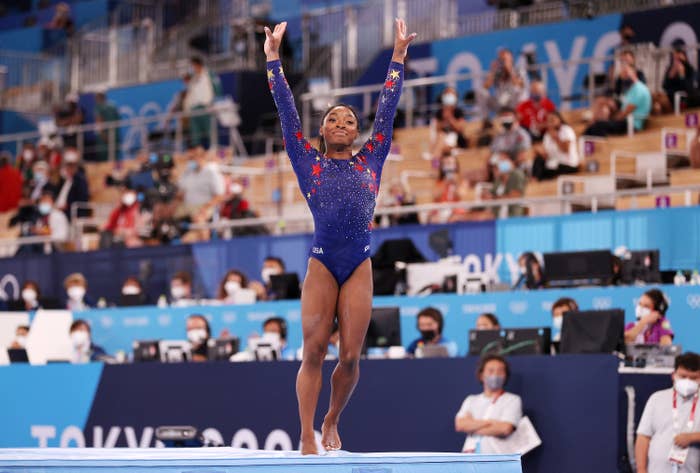The gymnast’s decision to withdraw from some of her competitions at the Tokyo Olympics shows how much talking publicly about mental health has lost its stigma.
Simone Biles salutes the judges after competing on balance beam during women’s qualification on day two of the Tokyo 2020 Olympic Games on July 25, 2021.
The comedian Mike Birbiglia has a good bit about how gymnastics asks too much of the athletes because it requires gymnasts to salute the judges with grace and composure after a bout of tumbling and turning and twisting and flinging themselves into the air. That salute is not just custom or tradition; it is actually a requirement of the sport. You could lose points if you don’t telegraph that you have it all together.
On Tuesday, Simone Biles, who few dispute is the greatest gymnast in the history of the sport, did not have it all together. She had the lowest score among the Team USA athletes in the first rotation. She briefly left the floor with a trainer, then returned wearing her sweatsuit, indicating that she was done for the day. USA Gymnastics then circulated a statement that Biles was withdrawing from team competition “due to a medical issue.” The statement said she would be “assessed daily to determine medical clearance for future competitions.”
A short while later, Biles tearfully cleared things up at a press conference: There was no physical injury — she withdrew, she said, because the pressure had become too much. “I was just, like, shaking, could barely nap. I just never felt like this going into a competition before,” Biles said. “And I tried to go out here and have fun. Warmup in the back went a little bit better. But then once I came out here, I was like, No, mental is not there, so I just need to let the girls do it and focus on myself.” She said she was having “a little bit of the twisties,” a kind of mental block that could make a gymnast lose control of their body if they’re not keeping track of how many twists they’ve already done. In a sport entirely about awareness and control, having neither is a dangerous thing.
On Wednesday, there was a further update: USA Gymnastics announced that Biles won’t compete in Thursday’s all-around — a competition she hasn’t lost since 2013. These are extraordinary moves from an athlete who, at 24 years old, has already revolutionized the sport and was seen as perfection manifest. For Biles to say that the pressure was too much is unprecedented. It is also a staggering vindication of the way the conversations about mental health have shifted in the last decade or so.
We’ve seen powerful and meaningful shifts in the way mental health is discussed in the public sphere. Newsrooms now have dedicated resources to cover mental health crises and changed style guides to combat stigma; celebrities have been frank about their struggles and invited the rest of us to join them; and employers are learning to adjust to the mental health needs of their employees. As a result, awareness of the way mental health affects us is increasing, and there is a common lexicon for how to talk about it.
That lexicon shows up throughout Biles’s statement. “I have to focus on my mental health and not jeopardize my health and well-being,” she said at the press conference, and it is the kind of statement she can say now because the efforts to destigmatize talking about anxiety are, in fact, working. Biles was the recipient of criticism for withdrawing, but she has also received an outpouring of support for sharing what she is going through.
She’s not the only one: Biles said she was inspired by tennis player Naomi Osaka, who withdrew from the French Open in May over the organization’s insistence that Osaka give press conferences that she says “bring doubt” into her mind and are harmful to her mental health.
Yet what these moves from Biles and Osaka also reveal are the limits of just focusing on stigma. You can only address the problem so much by just naming it. Osaka has been consistent in her position that the press conference format is exploitative, only benefitting tennis organizations that could leverage a star’s presence for TV time, and, therefore, ad sales.
Meanwhile, Biles has been open about her disdain for USA Gymnastics, an organization that has been in disarray for years. “At the end of the day, I’m not representing USA Gymnastics,” Biles told the New York Times last month. And why should she? American gymnasts, Biles included, have spoken out about the failures of the organization to protect athletes in the wake of the Larry Nassar abuse scandal.
Much has changed since the last time America fell in love with Biles at the 2016 Olympics in Rio de Janeiro. Three weeks after those Olympics ended, the first of many news stories about Nassar’s abuse broke. Biles told Vogue last year that during that period, she became depressed. “At one point I slept so much because, for me, it was the closest thing to death without harming myself,” she said. Then, in 2018, Biles spoke publicly about being one of the hundreds of women abused by Nassar. “Please believe me when I say it was a lot harder to first speak those words out loud than it is now to put them on paper,” she tweeted.
At the 2020 Tokyo Olympics, Biles is the only Nassar survivor on the US women’s team. For USA Gymnastics, she is the key to moving past the scandal. Nothing is wrong if you’re still winning medals, right? But she is also unquestionably the biggest star of all US Olympians. And the pressure to put on appearances that she’s moved past her trauma is high. She told Vogue that “[she] just felt like that’s what America wanted [her] to be—was perfect. Because every time an American wins the Olympics, you’re like America’s sweetheart. So it’s like, How could this happen to America’s sweetheart?” She said she “felt like [she] was letting other people down by this.”
So yeah, there is pressure. There is anxiety. It is a relief that Biles can say so. It is barrier-breaking that she can tell us she is prioritizing her mental health and we can understand it and celebrate it. But we’ve also learned that fighting stigma about mental health can only take us so far. USA Gymnastics still hasn’t laid out its plan to address its problems.
Biles hasn’t said much on social media since stepping back. But early Wednesday, she retweeted a screenshot of a statement from an anonymous gymnast that defended her decision and expressed rage at those questioning her toughness. “We are talking about the same girl who was molested by her team doctor throughout her entire childhood and teen years,” the statement read. It railed against “the joke of an organization who protected her predator instead of her and her teammates for years.” For someone as highly watched and deliberate as Biles, the retweet spoke volumes.
Out of all the well-wishers for Biles, there were two notable names from the 1996 Olympic US gymnastics team, also known as “the Magnificent Seven.” Dominique Moceanu, who was 14 when she got injured, tweeted that Biles is demonstrating that “we have a say in our own health—“a say” I NEVER felt I had as an Olympian.”
David Madison / Getty Images
Kerri Strug is carried by coach Béla Károlyi during the women’s gymnastics team competition at the 1996 Summer Olympic Games held on July 23 in the Georgia Dome in Atlanta.
Meanwhile, Moceanu’s fellow gold medalist Kerri Strug tweeted that she’s “sending love” to Biles. Strug became a household name after the 1996 Olympics when she sprained her ankle on the vault and managed to stick the landing of her second vault while injured. It was a performance hailed as heroic — one of the greatest Olympic moments of all time. But watching the video in 2021, it takes on a different flavor. Watching Strug let out a scream while hopping on one foot is agonizing. Her foot gave out while she raised her arms to salute the judges, and she dropped to the floor. You can only telegraph composure for so long with a sprained ankle.
In 1996, Strug’s self-sacrifice was the height of heroic achievement. In 2021, Biles’s insistence on preserving and protecting her mental well-being is seen as setting a positive example for the rest of us. Even Sunisa Lee, Team USA’s next best gymnast, tweeted that “we do not owe anyone a gold medal.” This week, there will be no salute to the judges from Biles, no signal that she has it all together, because she doesn’t. For saying so, she has been widely supported and applauded. That we have come this far is good. It’s a testament to the efforts of mental health activists to fight stigma so people can talk openly about what they are going through. But it has also revealed that challenging stigma is only the beginning of the fight.





